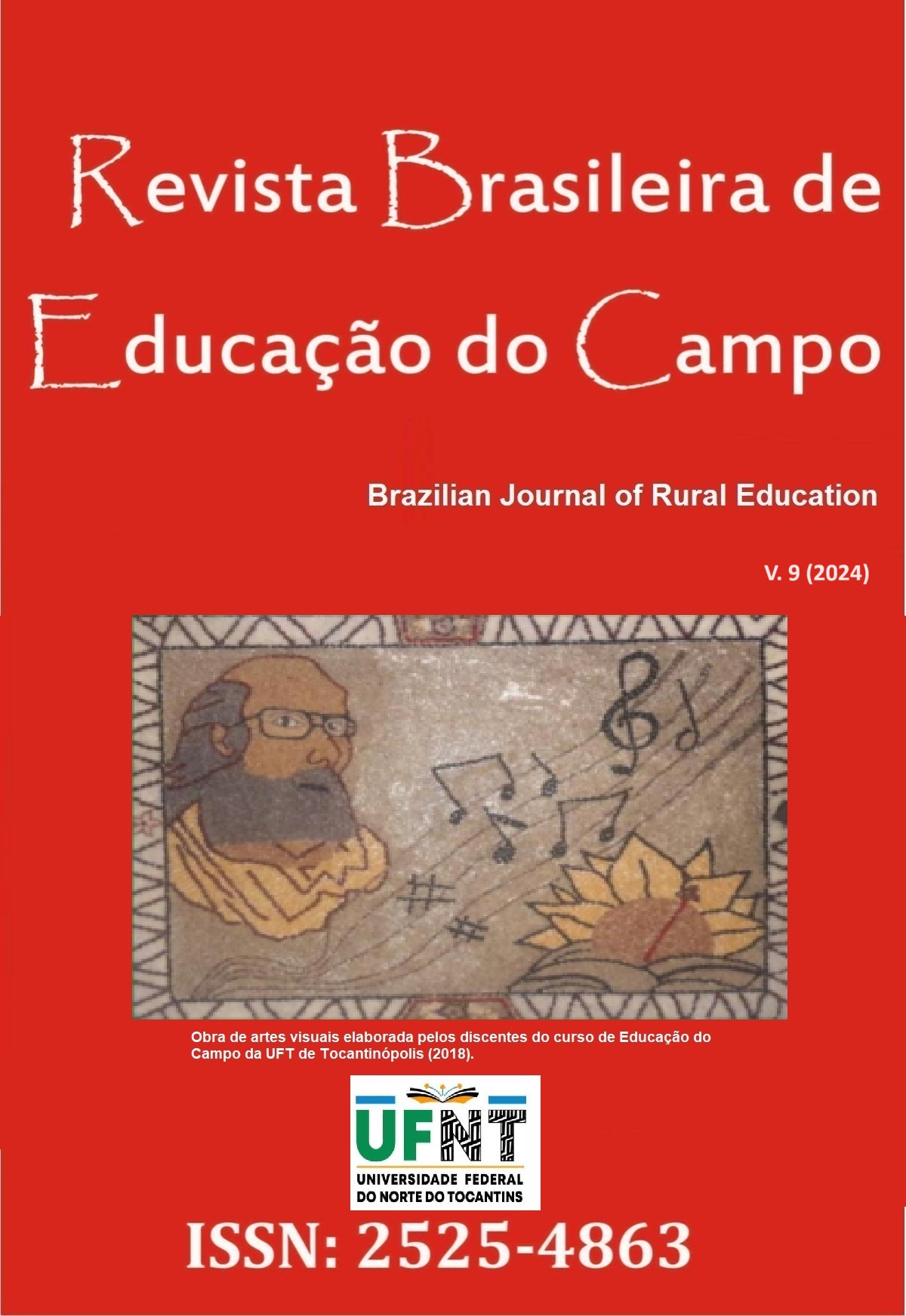Impacts caused by the closure of schools in the countryside in the municipality of Arraias-TO in the conception of the protagonists
DOI :
https://doi.org/10.70860/ufnt.rbec.e17766Résumé
ABSTRACT. This study is an excerpt from the Undergraduate Thesis in Pedagogy at the Federal University of Tocantins (UFT) and aims to analyze the school closure policy and the process of school nucleation in the municipality of Arraias (TO), as well as the impacts resulting from these measures. The research adopts a qualitative approach, based on bibliographic and field investigation. The data collection instruments include document analysis and semi-structured interviews conducted with students and parents/guardians residing in rural areas who study in the city, as well as teachers who receive these students. The research findings indicate that, in less than two decades, more than 48 schools have been closed, highlighting the precarious state of rural education and the incomplete implementation of municipal public policies. Among the main impacts of this scenario are the uprooting of students from their communities, their insertion into a context that differs from their cultural habits and customs, and the need for long daily commutes, often exceeding eight hours in school transportation. Given this reality, it is expected that this study will contribute to fostering a critical reflection on school closure and nucleation, as well as on public policies aimed at rural education.
Téléchargements
Références
Albuquerque, L. F. (2011). Fechamento de 24 mil escolas do campo é retrocesso. afirma dirigente do MST. Brasil de Fato (Site de notícias). Disponível em: https://www. brasildefato. com. br/node/6734.
Arroyo, M. G., Caldart, R. S., & Molina, M. C. (2011). Por uma educação do campo (5a ed.). Petrópolis, RJ: Vozes.
Caldart, R. S. (2003). A escola do campo em movimento. Currículo sem Fronteiras, 3(1), 60-81.
Cavalcante, R. L. A. (2003). A escola rural e seu professor no “Campo das Vertentes” (Tese de Doutorado). Pontifícia Universidade Católica, Rio de Janeiro.
Fernandes, B. M., & Molina, M. C. (2004). O campo da educação do campo. Por uma educação do campo: contribuições para a construção de um projeto de educação do campo. Brasília: Articulação Nacional “Por Uma Educação do Campo, 53-91.
Fernades, B. M., & Ceroli, P. R. (2011). Primeira Conferência Nacional “Por Uma Educação Básica do Campo”. In Arroyo, M. G., Caldart, R. S., & Molina, M. C. (Orgs.). Por uma educação do campo (pp. 54-80). Petrópolis, RJ: Vozes.
Freire, P. (2011). Pedagogia do oprimido. rev. e atual. Rio de Janeiro: Paz e Terra, 95-101.
Gil, A. C. (2002). Como classificar as pesquisas. Como elaborar projetos de pesquisa, v. 4.
Marconi, M., & Lakatos, E. (2003). Fundamentos de metodologia científica. 5° edição, Editora Atlas. São Paulo.
Minayo, M. C. D. S. (1994). Ciência, técnica e arte: o desafio da pesquisa social. Pesquisa social: teoria, método e criatividade, 21, 9-29.
Nunes, K. D. C. S. (2016). Cenário da educação do Campo no Estado do Tocantins. Espaço do Currículo, 9(2), 328-340.
Peripolli, O. J., & Zoia, A. (2011). O fechamento das escolas do campo: o anúncio do fim das comunidades rurais/camponesas. Revista Educação, Cultura e Sociedade, 1(2).
Rodrigues, A. C. D. S., Marques, D. F., Rodrigues, A. M., & Dias, G. L. (2017). Nucleação de Escolas no Campo: conflitos entre formação e desenraizamento. Educação e Realidade, 42(2), 707-728.
Pinheiro, M. D. S. D. (2007). A concepção de educação do campo no cenário das políticas públicas da sociedade brasileira. In Congresso Luso-Brasileiro de Política e Administração da Educação (pp. 1-20).
Varanda, L. F. C., & Aires, H. Q. P. (2024). Impactos causados pelo fechamento das escolas do/no campo no município de Arraias na concepção dos protagonistas. Rev. Bras. Educ. Camp., 9, e17766.
Téléchargements
Publié-e
Comment citer
Numéro
Rubrique
Licence
© Luiz Felipe de Castro Varanda, Helena Quirino Porto Aires 2024

Cette œuvre est sous licence Creative Commons Attribution 4.0 International.
Proposal for Copyright Notice Creative Commons
1. Policy Proposal to Open Access Journals
Authors who publish with this journal agree to the following terms:
A. Authors retain copyright and grant the journal right of first publication with the work simultaneously licensed under the Creative Commons Attribution License that allows sharing the work with recognition of its initial publication in this journal.
B. Authors are able to take on additional contracts separately, non-exclusive distribution of the version of the paper published in this journal (ex .: publish in institutional repository or as a book), with an acknowledgment of its initial publication in this journal.
C. Authors are permitted and encouraged to post their work online (eg .: in institutional repositories or on their website) at any point before or during the editorial process, as it can lead to productive exchanges, as well as increase the impact and the citation of published work (See the Effect of Open Access).














